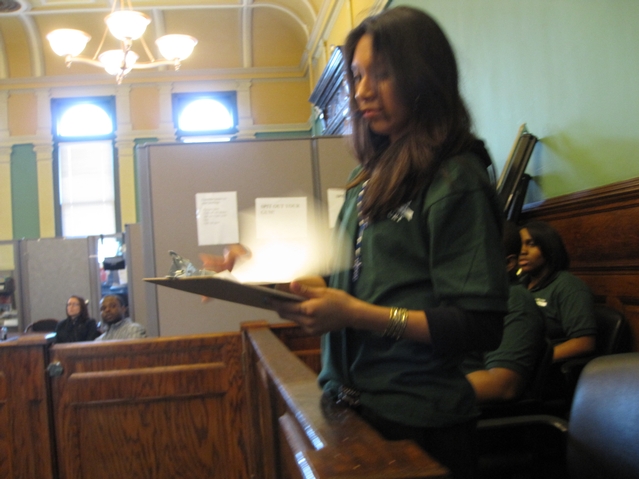Harlem Youth Court Seeks Positive Outcomes for Teens in Trouble
April 5, 2011 6:53pm
Manhattan District Attorney's office will send Harlem teens to local youth court to be tried by their peers.

By Jeff Mays
DNAinfo Reporter/Producer
HARLEM — Stephanie Rosario, 16, had missed more than 50 days of school before she found herself sitting inside the Harlem Youth Court with her mother.
The judge, jury, defense attorney and prosecutor were, like her, teenagers. At first, she said that various illnesses had caused her to miss a lot of school. But the teens of the youth court kept digging.
"When you are not sick, do you miss school?" asked Brielle Siler, 17.
Shaquana Harvey, 17, turned the questioning to Rosario's mother.
"Is she telling the truth?" she asked.
"Sometimes, I think she just made it up," Yurkis Vasquez, Rosario's mother, answered.
The youth court is a project of the Harlem Community Justice Center. It hears low-level cases such as truancy and teen drinking in an effort to have teens receive positive reinforcement from their peers.
Previously, referrals came just from police and schools, but Manhattan District Attorney Cy Vance Jr. announced last week that his office would begin sending cases there.
"Having this pipeline is helpful because it means these kids will be dealing with peers from their own community and it is also moving these cases out of the criminal justice system," said Christopher Watler, project director for the center.
As the court of peers continued to pepper Rosario with questions Monday, she finally mentioned another reason she didn't want to go to school.
"I don't feel comfortable," she said. Because of a language barrier when she was younger, Rosario was a year behind. In class, she said, "everyone is younger than me."
The teens of the court deliberated for 10 minutes and then assigned Rosario tutoring in all subjects to help her catch up in her classes and a "goal development" workshop to plan her future.
"This will give me more motivation," Rosario said afterward of her experience with the court. "I was becoming frustrated because my younger classmates understood the work and I didn't."
Some court officers, like Manty Hernandez, 16, who served as the jury foreman, were once in Rosario's seat. A little more than a year ago, Hernandez was busted by police for tagging a wall in Midtown.
"I know what she was going through," said Hernandez. "Coming here really helped me because I haven't tagged a wall since."
E.J. Alexander, 16, said he also sympathized with Rosario because he, too, used to get into trouble for skipping school. That has changed since he joined the program.
"I'm working on myself as I'm trying to help others," he said.
Khadija Crute, 17, who served as the judge, has been involved with the program for three years. She sees it as preparation for her future career as possibly an entertainment lawyer, criminal defense attorney or a judge.
"We are helping people. This is not a punishment. We are trying to get to people before they have to face a real punishment," said Crute.
"These kids are learning about justice and looking to be leaders in their community," said Susanna Osorno-Crandall, a manager at the justice center.
At the same time, they are learning about public speaking and critical thinking, among other skills, added program coordinator Sonia Balaram. After the trial, the kids dissected their performance and talked about ways to ask better questions.
"The goal is to not only help them excel in this space but give them skills they can use later in life," said Balaram.
Rosario said she was skeptical of the program at first but was happy with the outcome.
"I need to start from the beginning and get things together," she said. "This helped."
By Jeff Mays, DNAinfo.com

No comments:
Post a Comment